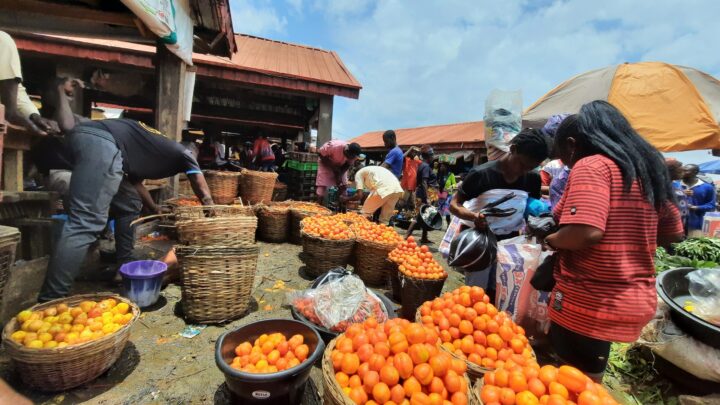Oke-Odo tomato section, Lagos
BY CHIAMAKA ADINNU
Food security remains a critical issue in many regions of the world, and Africa is no exception. The global food security challenge is fueled by various barriers to trade, such as tariffs and non-tariff barriers (NTBs). While tariffs involve the imposition of traditional customs duties on goods, NTBs include a wide range of measures that restrict the import and flow of goods across borders, through import quotas, import restrictions, excessive administrative processes, and sanitary and phytosanitary measures.
Although tariffs, as a trade barrier, have generally received more attention as the central focus of most trade negotiations, non-tariff barriers represent a greater and hidden menace to international trade, particularly in the agricultural sector. NTBs such as import quotas, technical regulations, and sanitary and phytosanitary measures pose significant challenges to intra-African agricultural trade and hinder food security efforts.
African countries typically employ import quotas to regulate the balance of trade and decrease over-reliance on foreign products. But such restrictions negatively impact trade dynamics leading to higher prices and reduced choices for consumers, due to the imposed limits on the quantity of agricultural products that can be imported. Nigeria’s import quota on rice is a prime instance. The Nigerian trade restriction on the importation of rice in 2015 was established with the assumption that it would automatically boost domestic production. However, this was not the case, as the price of rice instantly doubled following the regulation, inflicting severe economic hardships on citizens. Moreover, the anticipated sustainable increase in domestic production to meet the huge national demand was hardly recorded, as Nigeria is yet to attain self-sufficiency in rice production almost a decade after.
Advertisement
Similarly, import restrictions like bans or embargoes, are imposed for various reasons in African countries. The commonly cited reasons are to protect domestic industries, or in response to sanitary and health concerns. But such restrictions disrupt trade flows and reduce the availability of certain food products, with severe consequences, particularly for regions that are heavily reliant on specific imports. A good instance is the decade-long sugar import restriction in Kenya. Since 2014, Kenya has safeguarded its domestic production by setting limits on sugar imports to restrict the flow of cheaper sugar from other African countries. But this restriction has proved to be ineffective at best as the country continues to lag behind in completing reforms that will make its sugar industry competitive, amid battling acute shortage of the commodity.
Beyond the import quotas and restrictions, some African countries employ cumbersome administrative processes and excessive documentation requirements at border crossings to limit agricultural imports. In Nigeria, the excessive bureaucratic red tape at ports and border crossings contribute to delays in clearing goods. For agricultural products that are known for their high perishability, these delays often result in food waste and spoilage. These wastes reduce the overall food availability in local and international markets. Beyond the waste, such bureaucracies lead to higher transaction costs which influence the final cost of food products, hence negatively impacting food security.
Typically, countries establish sanitary and phytosanitary measures (SPS) aimed at protecting human, animal, and plant health. Although SPS measures are inarguably essential in their role of safeguarding human and animal health, some countries often use them as non-tariff tools to protect domestic industries. This happens when a particular country practices inconsistent regulatory frameworks or stringent quality requirements, that ultimately create hurdles for exporting countries.
Advertisement
In Africa, meeting stringent quality and sanitary standards set by importing countries can be challenging due to limited resources and technical capacity. Nigerian exporters, for example, have encountered difficulties in complying with European Union (EU) standards for pesticide residues, leading to rejected shipments and loss of market access. Such excessive requirements and divergent standards among countries can impede trade and hinder access to safe and nutritious food.
The importance of promoting trade facilitation for enhanced food security
It is increasingly obvious that non-tariff measures (NTMs) mitigate against food security by posing a barrier to the participation of developing countries in growing international trade. Efficient food trade between countries is central to strengthening domestic and regional food security. Therefore, African countries aiming to attain food security must consider promoting trade facilitation in the agricultural sector. Various measures such as harmonization of standards, capacity-building programmes and reforms, and transparent information exchange are viable ways to promote food trade.
Promoting regional and international cooperation in harmonising standards and regulations across countries is necessary to streamline trade procedures. Regional and international initiatives, such as the African Continental Free Trade Area (AfCFTA) and the World Trade Organization (WTO), can play a vital role in promoting dialogue and cooperation to align regulations and reduce unnecessary trade barriers. Countries should utilize these initiatives for harmonization of standards as relates to food trade.
Advertisement
In terms of capacity building, countries must prioritise establishing reforms that allow them to meet international standards and comply with technical regulations. This includes embracing technological advances and developments to help domestic industries produce high-quality products that can compete favourably with foreign products. Such growth enhances their participation in global trade and contributes to food security.
It is equally important for countries to improve transparency in the implementation of non-tariff measures. Facilitating quick and efficient information exchange among trading partners serves to enhance trust and reduce uncertainties. Moreover, establishing such platforms for sharing information on regulations, standards, and SPS measures can assist exporters in understanding requirements and complying with them effectively.
In summary, non-tariff barriers and measures pose significant challenges to food security by impeding trade flows and limiting access to affordable and nutritious food. Import quotas, import restrictions, excessive administrative processes, and sanitary and phytosanitary measures have varying impacts on food availability and affordability.
However, countries can unlock the potential of international trade in ensuring food security by promoting trade facilitation through harmonization of standards, capacity building, and enhanced transparency. Such measures address nontariff barriers and pave the way for a more secure and sustainable global food system.
Advertisement
Chiamaka Adinnu is a trade fellow at the Ominira Initiative for economic advancement. She is currently studying for a master’s degree in food safety and quality engineering. She can be reached via [email protected]
Advertisement
Views expressed by contributors are strictly personal and not of TheCable.
Add a comment






